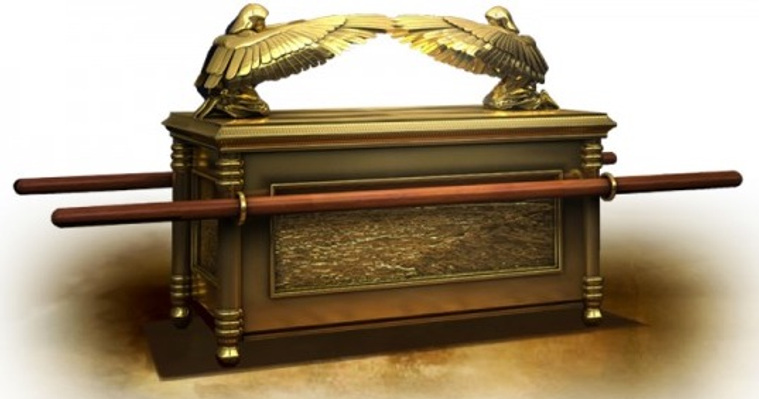Steve Hall
The concept of the standard is found throughout history, from Constantine's cross --- 'in this sign you will conquer' --- to the skull and crossbones on the Pirate ship to the Stars and Stripes at Iowa Jima.
Drastic Measures
http://www.usccb.org/bible/readings/011416.cfm
1 Samuel 4:1-11
Mark 1:40-45
This morning's readings contain the kind of contrast which we seldom, if ever, see in the pairing of Scripture selections.
The Old Testament text, the one from the first Book of Samuel, describes an incident prior to the days when Israel had a king. Hypothetically, the twelve tribes were supposed to live in support of one another, lending a hand or providing defense as circumstances required. The Philistines were a people who lived along the southwest coast of Palestine, an area which encompasses the present day Gaza Strip. In these early years, following the movement of the Children of Israel into the Promised Land, the Philistines were a thorn in the side. They had been involved in previous battles with the Israelites. Some of those battles were described in the Old Testament, particularly in the Book of Judges. Most memorable would be the conflicts at the time of Samson, the big guy who was sorely in need of a haircut.
In the first part of this Old Testament reading we find the forces of Israel defeated by the Philistine army. The subsequent, though unrecorded, scene in the Israeli locker room at halftime is not a difficult one to imagine. The elders-generals-coaches were trying to analyze the poor performance of the team in the first half as well as trying to review the equipment they had brought with them. They had just lost four thousand from the team and those remaining were sorely demoralized. A pep talk just wouldn't be enough. Far more drastic measures were needed. As anyone would, they decided to bring on the big gun --- after all, there were no restrictions about adding a new player. They sent for the Ark of the Covenant which was being kept in the village of Shiloh.
"Let us fetch the ark of the LORD from Shiloh
that's it may go into battle among us
and save us from the grasp of our enemies.”
Now it should be remembered that the God of Israel was not known as the "Lord, God of Hosts" for nothing. The title literally means "Lord, God of Armies." (You might remember that, when Peter cut off the ear of the servant of the High Priest, Jesus told him: "Do you think that I cannot appeal to my Father, and he will at once send me more than twelve legions of angels?"(Matthew 26:53)) After all, the Lord had defeated the army of Pharaoh; he had defeated the opposing forces at Jericho; he had defeated the Philistines before through his servant Sampson. Surely, he could do it once again. So the elders-generals-coaches decided: if we send someone to bring the Lord's Throne, the Ark of the Covenant, here to be with us in battle, then we shall most certainly win. NOT!
The second defeat was worse than the first.
Seven times as many men were lost.
The gambit had failed.
My initial reaction was that that decision to bring the Ark to the scene of the battle was a commendable one. And I have to admit that I was initially surprised when I read that they not only lost the second battle, they lost it in a a devastating way. What, I thought, is going on here? Clearly, not everything is readily apparent. What am I to understand when God seems to leave his people to their own devices?
Let's go to what we know from the Word of God we've been given. What is evident in this account is that the Ark was physically absent from the Israelite camp at the time of the first battle. But, further, it seems safe to assume that the absence was a spiritual one as well. The Ark was to be their standard. After all, when they eventually sent for the Ark it was so "it may go into battle among us." A standard is a formal, visual symbol or emblem, of the person, state or cause for which a group acts. The standard goes into battle among the soldiers. The concept of the standard is found throughout history, from Constantine's cross --- 'in this sign you will conquer' --- to the skull and crossbones on the Pirate ship to the Stars and Stripes at Iowa Jima. An interesting shift in strategy. God was not the one for whom and with whom the army acted in the first battle; but supposedly he would be so during the second battle. That seems disingenuous.
So it appears that my reflection thus far has lead me to at least one conclusion: Our God does not want us to call on him as the option of last resort. For whatever reason, whatever motivation, whatever superstition, the children of Israel did just that. God was their last resort in the battle with the Philistines. Originally they went into battle and left God behind. If they left him behind in such an important matter, how much greater would have been the tendency to have done so with the ordinary affairs of life.
Further, the readiness of our God to be present among us is not a permission slip to wield his power as the sword of our vengeance. Neither is it a punishment with which we may admonish and threaten and correct other people in our lives --- not even for the purpose of teaching our children. The presence of God, the power of God is not something for us to use at all; but that's something the Israelites attempted to do, as if God were just another weapon to wield in battle.
Let's turn to the Gospel reading; it's a lot more encouraging.
A leper came to him and kneeling down begged him and said,
“If you wish, you can make me clean.”
Moved with pity, he stretched out his hand, touched the leper, and said to him,
“I do will it. Be made clean.”
We know from the account of Mark that the leper's action and words were both simple and straightforward.
A leper came to him
He kneeled down
He begged of him
We also know from our knowledge of ancient history that the leper's behavior was totally unacceptable. The social/cultural rules were clear. The leper was not allowed to approach those in the 'normal' population. The leper was to stay in specifically designated areas. The leper was to especially avoid any physical contact with others. The leper was unclean. Because of these socially imposed restrictions, we also know that the leper acted with courage and expectation.
Such details provide quite a contrast to the presumption of the Israelite warriors fighting the Philistines. The leper trusts in God but does not presume upon God. He had no other options so he didn't turn to Jesus as his last option. And, while the healing from leprosy would be a benefit primarily for him, it was not at the expense of others.
But I find more in this amazing story.
Leprosy is the kind of disease that can easily make an afflicted person choose to shun other people because of the deformity and/or physical deterioration that it causes. Feelings of guilt, shame, unworthiness, being abnormal and the like may well follow as the exterior symptoms manifest themselves. Think of the 'elephant man' (a condition caused by a different disease) and the hood he wore over his head.
As I read and reread this short passage it's significance as a metaphor for my relationship with the Triune God became increasingly evident. Recognizing my sinfulness puts me in a position similar to that of the leper. In fact, I find I am the petitioning leper. (Here, I can only speak for myself.) The more I have come to know God the more I have come to know the enormity of my distance from him; and, while my sin may seem minor when compared with the sinful possibilities available to me, my shame and my inadequacy are the more profound because of the chasm between the Holy and myself which I perceive to exist. That's why the prayer of the Psalmist resonates so clearly.
"Have mercy on me, God, in accord with your merciful love; in your abundant compassion blot out my transgressions.
Thoroughly wash away my guilt; and from my sin cleanse me.
For I know my transgressions; my sin is always before me.
Against you, you alone have I sinned; I have done what is evil in your eyes So that you are just in your word, and without reproach in your judgment.
. . . wash me, and I shall be whiter than snow." (Psalms 51:3-7)
Could my plea be any clearer?
“If you wish, you can make me clean.”
And it's as if I am given the teaching of Paul to ensure that I hear the reply.
"But you were washed,
you were sanctified,
you were justified
in the name of the Lord Jesus Christ and in the Spirit of our God."
(1 Corinthians 6:11)
And I, the leper, hear the words my aching heart has desired so desperately:
"The blood of Jesus his Son cleanses us from all sin." (1 John 1:7)
“I do will it. Be made clean.”

